World War I: An Analysis of the Causes, Alliances, and Outcomes
VerifiedAdded on 2020/10/04
|6
|1399
|258
Essay
AI Summary
This essay provides an overview of the causes of World War I, also known as the Great War. It examines key factors such as imperialism, nationalism, alliances, and militarism, highlighting how these elements contributed to the outbreak of the conflict. The essay discusses the formation of alliances like the Triple Alliance and Triple Entente, emphasizing how these agreements created a climate of fear and suspicion among European nations. It also explores the role of militarism and the arms race, as well as the impact of nationalism, including the assassination of Archduke Franz Ferdinand, which triggered the war. The essay concludes that alliances were a primary catalyst, as they drew multiple nations into the conflict. The essay draws on various sources to support its arguments.
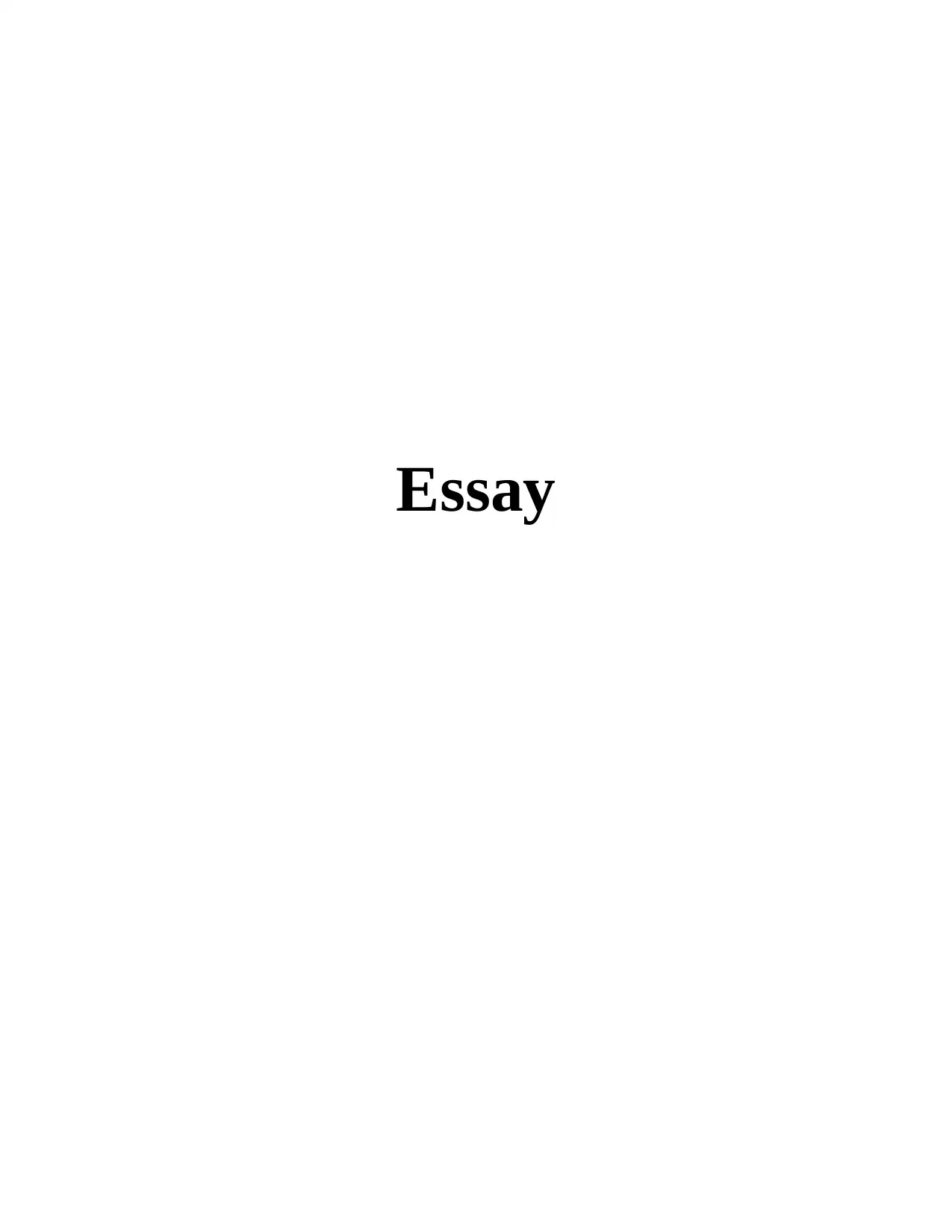
Essay
Paraphrase This Document
Need a fresh take? Get an instant paraphrase of this document with our AI Paraphraser
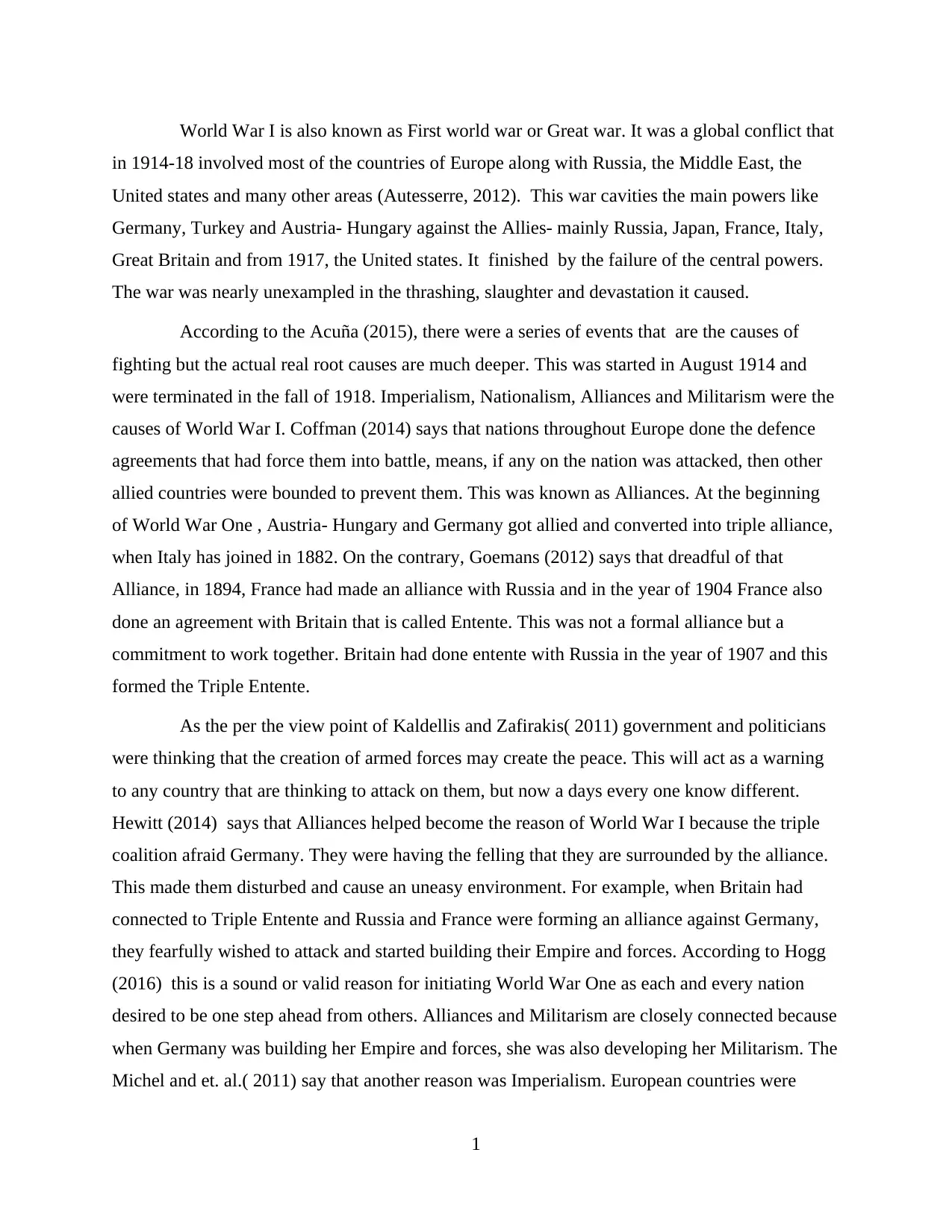
World War I is also known as First world war or Great war. It was a global conflict that
in 1914-18 involved most of the countries of Europe along with Russia, the Middle East, the
United states and many other areas (Autesserre, 2012). This war cavities the main powers like
Germany, Turkey and Austria- Hungary against the Allies- mainly Russia, Japan, France, Italy,
Great Britain and from 1917, the United states. It finished by the failure of the central powers.
The war was nearly unexampled in the thrashing, slaughter and devastation it caused.
According to the Acuña (2015), there were a series of events that are the causes of
fighting but the actual real root causes are much deeper. This was started in August 1914 and
were terminated in the fall of 1918. Imperialism, Nationalism, Alliances and Militarism were the
causes of World War I. Coffman (2014) says that nations throughout Europe done the defence
agreements that had force them into battle, means, if any on the nation was attacked, then other
allied countries were bounded to prevent them. This was known as Alliances. At the beginning
of World War One , Austria- Hungary and Germany got allied and converted into triple alliance,
when Italy has joined in 1882. On the contrary, Goemans (2012) says that dreadful of that
Alliance, in 1894, France had made an alliance with Russia and in the year of 1904 France also
done an agreement with Britain that is called Entente. This was not a formal alliance but a
commitment to work together. Britain had done entente with Russia in the year of 1907 and this
formed the Triple Entente.
As the per the view point of Kaldellis and Zafirakis( 2011) government and politicians
were thinking that the creation of armed forces may create the peace. This will act as a warning
to any country that are thinking to attack on them, but now a days every one know different.
Hewitt (2014) says that Alliances helped become the reason of World War I because the triple
coalition afraid Germany. They were having the felling that they are surrounded by the alliance.
This made them disturbed and cause an uneasy environment. For example, when Britain had
connected to Triple Entente and Russia and France were forming an alliance against Germany,
they fearfully wished to attack and started building their Empire and forces. According to Hogg
(2016) this is a sound or valid reason for initiating World War One as each and every nation
desired to be one step ahead from others. Alliances and Militarism are closely connected because
when Germany was building her Empire and forces, she was also developing her Militarism. The
Michel and et. al.( 2011) say that another reason was Imperialism. European countries were
1
in 1914-18 involved most of the countries of Europe along with Russia, the Middle East, the
United states and many other areas (Autesserre, 2012). This war cavities the main powers like
Germany, Turkey and Austria- Hungary against the Allies- mainly Russia, Japan, France, Italy,
Great Britain and from 1917, the United states. It finished by the failure of the central powers.
The war was nearly unexampled in the thrashing, slaughter and devastation it caused.
According to the Acuña (2015), there were a series of events that are the causes of
fighting but the actual real root causes are much deeper. This was started in August 1914 and
were terminated in the fall of 1918. Imperialism, Nationalism, Alliances and Militarism were the
causes of World War I. Coffman (2014) says that nations throughout Europe done the defence
agreements that had force them into battle, means, if any on the nation was attacked, then other
allied countries were bounded to prevent them. This was known as Alliances. At the beginning
of World War One , Austria- Hungary and Germany got allied and converted into triple alliance,
when Italy has joined in 1882. On the contrary, Goemans (2012) says that dreadful of that
Alliance, in 1894, France had made an alliance with Russia and in the year of 1904 France also
done an agreement with Britain that is called Entente. This was not a formal alliance but a
commitment to work together. Britain had done entente with Russia in the year of 1907 and this
formed the Triple Entente.
As the per the view point of Kaldellis and Zafirakis( 2011) government and politicians
were thinking that the creation of armed forces may create the peace. This will act as a warning
to any country that are thinking to attack on them, but now a days every one know different.
Hewitt (2014) says that Alliances helped become the reason of World War I because the triple
coalition afraid Germany. They were having the felling that they are surrounded by the alliance.
This made them disturbed and cause an uneasy environment. For example, when Britain had
connected to Triple Entente and Russia and France were forming an alliance against Germany,
they fearfully wished to attack and started building their Empire and forces. According to Hogg
(2016) this is a sound or valid reason for initiating World War One as each and every nation
desired to be one step ahead from others. Alliances and Militarism are closely connected because
when Germany was building her Empire and forces, she was also developing her Militarism. The
Michel and et. al.( 2011) say that another reason was Imperialism. European countries were
1
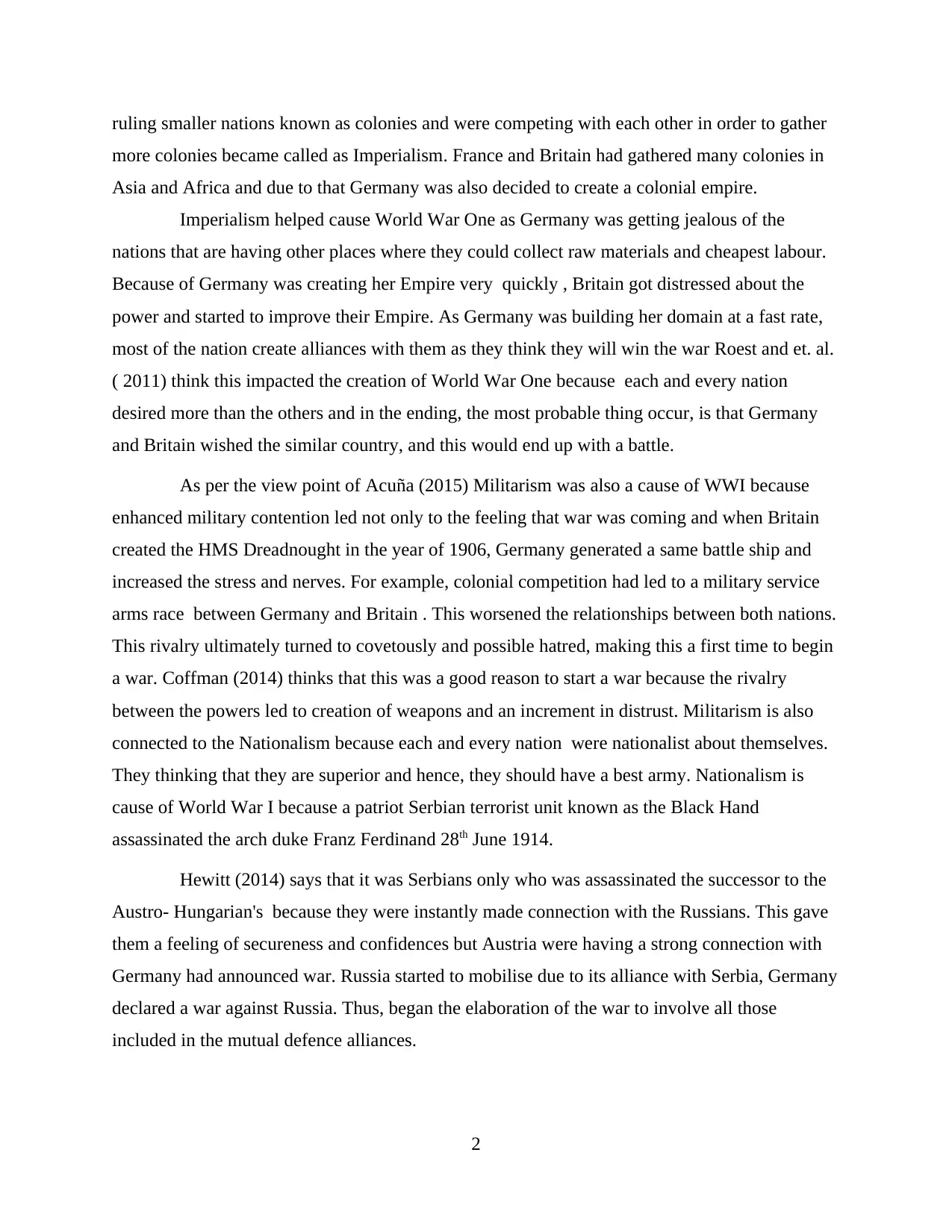
ruling smaller nations known as colonies and were competing with each other in order to gather
more colonies became called as Imperialism. France and Britain had gathered many colonies in
Asia and Africa and due to that Germany was also decided to create a colonial empire.
Imperialism helped cause World War One as Germany was getting jealous of the
nations that are having other places where they could collect raw materials and cheapest labour.
Because of Germany was creating her Empire very quickly , Britain got distressed about the
power and started to improve their Empire. As Germany was building her domain at a fast rate,
most of the nation create alliances with them as they think they will win the war Roest and et. al.
( 2011) think this impacted the creation of World War One because each and every nation
desired more than the others and in the ending, the most probable thing occur, is that Germany
and Britain wished the similar country, and this would end up with a battle.
As per the view point of Acuña (2015) Militarism was also a cause of WWI because
enhanced military contention led not only to the feeling that war was coming and when Britain
created the HMS Dreadnought in the year of 1906, Germany generated a same battle ship and
increased the stress and nerves. For example, colonial competition had led to a military service
arms race between Germany and Britain . This worsened the relationships between both nations.
This rivalry ultimately turned to covetously and possible hatred, making this a first time to begin
a war. Coffman (2014) thinks that this was a good reason to start a war because the rivalry
between the powers led to creation of weapons and an increment in distrust. Militarism is also
connected to the Nationalism because each and every nation were nationalist about themselves.
They thinking that they are superior and hence, they should have a best army. Nationalism is
cause of World War I because a patriot Serbian terrorist unit known as the Black Hand
assassinated the arch duke Franz Ferdinand 28th June 1914.
Hewitt (2014) says that it was Serbians only who was assassinated the successor to the
Austro- Hungarian's because they were instantly made connection with the Russians. This gave
them a feeling of secureness and confidences but Austria were having a strong connection with
Germany had announced war. Russia started to mobilise due to its alliance with Serbia, Germany
declared a war against Russia. Thus, began the elaboration of the war to involve all those
included in the mutual defence alliances.
2
more colonies became called as Imperialism. France and Britain had gathered many colonies in
Asia and Africa and due to that Germany was also decided to create a colonial empire.
Imperialism helped cause World War One as Germany was getting jealous of the
nations that are having other places where they could collect raw materials and cheapest labour.
Because of Germany was creating her Empire very quickly , Britain got distressed about the
power and started to improve their Empire. As Germany was building her domain at a fast rate,
most of the nation create alliances with them as they think they will win the war Roest and et. al.
( 2011) think this impacted the creation of World War One because each and every nation
desired more than the others and in the ending, the most probable thing occur, is that Germany
and Britain wished the similar country, and this would end up with a battle.
As per the view point of Acuña (2015) Militarism was also a cause of WWI because
enhanced military contention led not only to the feeling that war was coming and when Britain
created the HMS Dreadnought in the year of 1906, Germany generated a same battle ship and
increased the stress and nerves. For example, colonial competition had led to a military service
arms race between Germany and Britain . This worsened the relationships between both nations.
This rivalry ultimately turned to covetously and possible hatred, making this a first time to begin
a war. Coffman (2014) thinks that this was a good reason to start a war because the rivalry
between the powers led to creation of weapons and an increment in distrust. Militarism is also
connected to the Nationalism because each and every nation were nationalist about themselves.
They thinking that they are superior and hence, they should have a best army. Nationalism is
cause of World War I because a patriot Serbian terrorist unit known as the Black Hand
assassinated the arch duke Franz Ferdinand 28th June 1914.
Hewitt (2014) says that it was Serbians only who was assassinated the successor to the
Austro- Hungarian's because they were instantly made connection with the Russians. This gave
them a feeling of secureness and confidences but Austria were having a strong connection with
Germany had announced war. Russia started to mobilise due to its alliance with Serbia, Germany
declared a war against Russia. Thus, began the elaboration of the war to involve all those
included in the mutual defence alliances.
2
⊘ This is a preview!⊘
Do you want full access?
Subscribe today to unlock all pages.

Trusted by 1+ million students worldwide
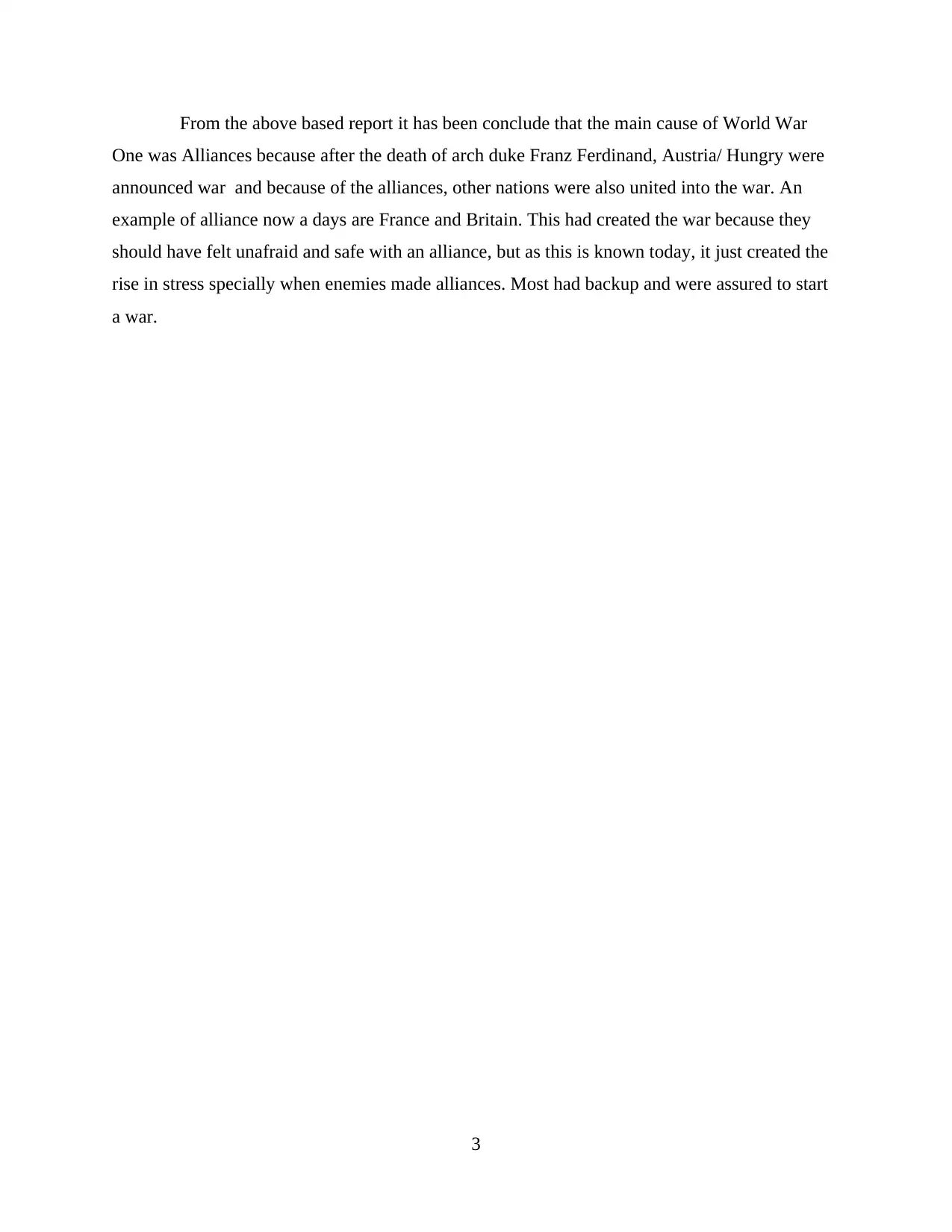
From the above based report it has been conclude that the main cause of World War
One was Alliances because after the death of arch duke Franz Ferdinand, Austria/ Hungry were
announced war and because of the alliances, other nations were also united into the war. An
example of alliance now a days are France and Britain. This had created the war because they
should have felt unafraid and safe with an alliance, but as this is known today, it just created the
rise in stress specially when enemies made alliances. Most had backup and were assured to start
a war.
3
One was Alliances because after the death of arch duke Franz Ferdinand, Austria/ Hungry were
announced war and because of the alliances, other nations were also united into the war. An
example of alliance now a days are France and Britain. This had created the war because they
should have felt unafraid and safe with an alliance, but as this is known today, it just created the
rise in stress specially when enemies made alliances. Most had backup and were assured to start
a war.
3
Paraphrase This Document
Need a fresh take? Get an instant paraphrase of this document with our AI Paraphraser
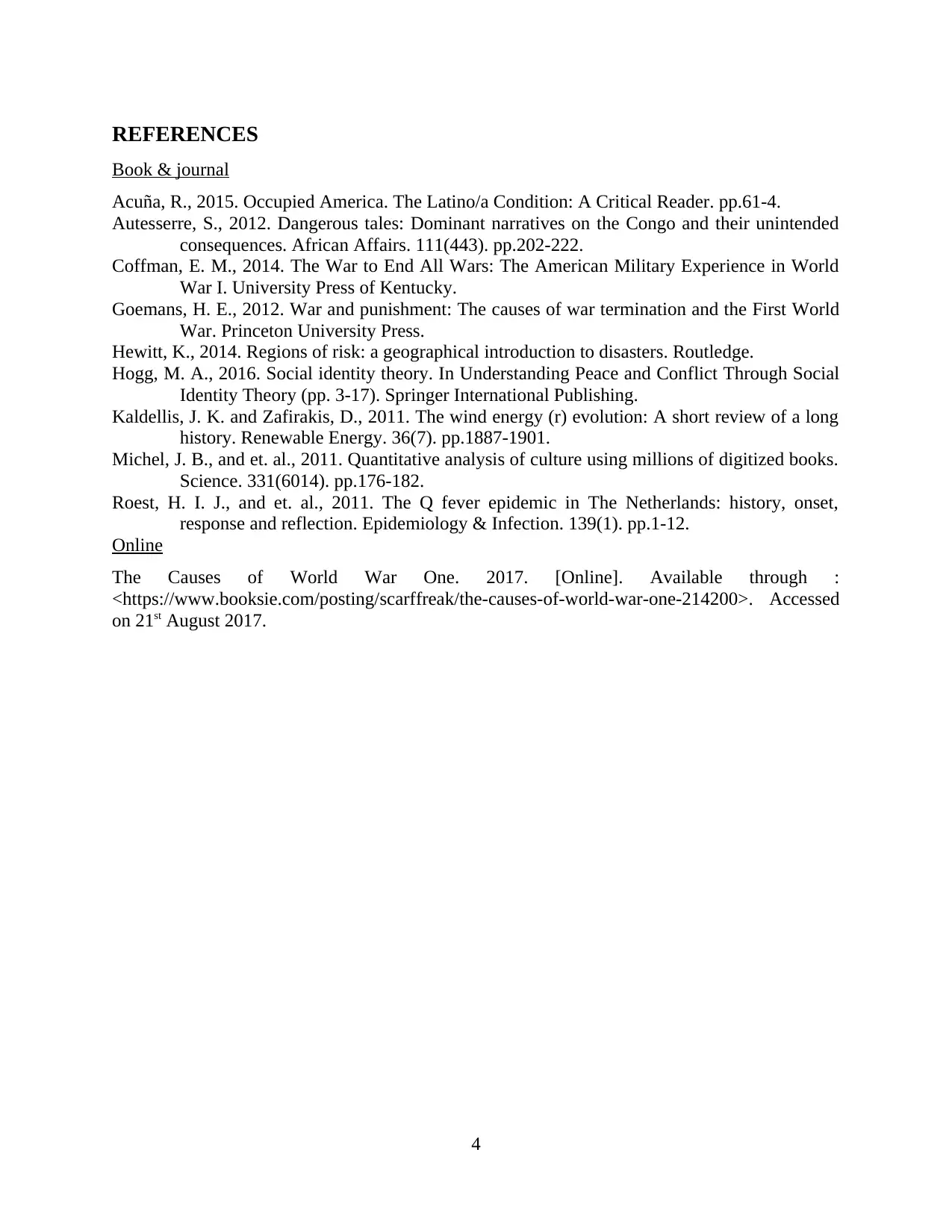
REFERENCES
Book & journal
Acuña, R., 2015. Occupied America. The Latino/a Condition: A Critical Reader. pp.61-4.
Autesserre, S., 2012. Dangerous tales: Dominant narratives on the Congo and their unintended
consequences. African Affairs. 111(443). pp.202-222.
Coffman, E. M., 2014. The War to End All Wars: The American Military Experience in World
War I. University Press of Kentucky.
Goemans, H. E., 2012. War and punishment: The causes of war termination and the First World
War. Princeton University Press.
Hewitt, K., 2014. Regions of risk: a geographical introduction to disasters. Routledge.
Hogg, M. A., 2016. Social identity theory. In Understanding Peace and Conflict Through Social
Identity Theory (pp. 3-17). Springer International Publishing.
Kaldellis, J. K. and Zafirakis, D., 2011. The wind energy (r) evolution: A short review of a long
history. Renewable Energy. 36(7). pp.1887-1901.
Michel, J. B., and et. al., 2011. Quantitative analysis of culture using millions of digitized books.
Science. 331(6014). pp.176-182.
Roest, H. I. J., and et. al., 2011. The Q fever epidemic in The Netherlands: history, onset,
response and reflection. Epidemiology & Infection. 139(1). pp.1-12.
Online
The Causes of World War One. 2017. [Online]. Available through :
<https://www.booksie.com/posting/scarffreak/the-causes-of-world-war-one-214200>. Accessed
on 21st August 2017.
4
Book & journal
Acuña, R., 2015. Occupied America. The Latino/a Condition: A Critical Reader. pp.61-4.
Autesserre, S., 2012. Dangerous tales: Dominant narratives on the Congo and their unintended
consequences. African Affairs. 111(443). pp.202-222.
Coffman, E. M., 2014. The War to End All Wars: The American Military Experience in World
War I. University Press of Kentucky.
Goemans, H. E., 2012. War and punishment: The causes of war termination and the First World
War. Princeton University Press.
Hewitt, K., 2014. Regions of risk: a geographical introduction to disasters. Routledge.
Hogg, M. A., 2016. Social identity theory. In Understanding Peace and Conflict Through Social
Identity Theory (pp. 3-17). Springer International Publishing.
Kaldellis, J. K. and Zafirakis, D., 2011. The wind energy (r) evolution: A short review of a long
history. Renewable Energy. 36(7). pp.1887-1901.
Michel, J. B., and et. al., 2011. Quantitative analysis of culture using millions of digitized books.
Science. 331(6014). pp.176-182.
Roest, H. I. J., and et. al., 2011. The Q fever epidemic in The Netherlands: history, onset,
response and reflection. Epidemiology & Infection. 139(1). pp.1-12.
Online
The Causes of World War One. 2017. [Online]. Available through :
<https://www.booksie.com/posting/scarffreak/the-causes-of-world-war-one-214200>. Accessed
on 21st August 2017.
4

5
⊘ This is a preview!⊘
Do you want full access?
Subscribe today to unlock all pages.

Trusted by 1+ million students worldwide
1 out of 6
Related Documents
Your All-in-One AI-Powered Toolkit for Academic Success.
+13062052269
info@desklib.com
Available 24*7 on WhatsApp / Email
![[object Object]](/_next/static/media/star-bottom.7253800d.svg)
Unlock your academic potential
Copyright © 2020–2026 A2Z Services. All Rights Reserved. Developed and managed by ZUCOL.





